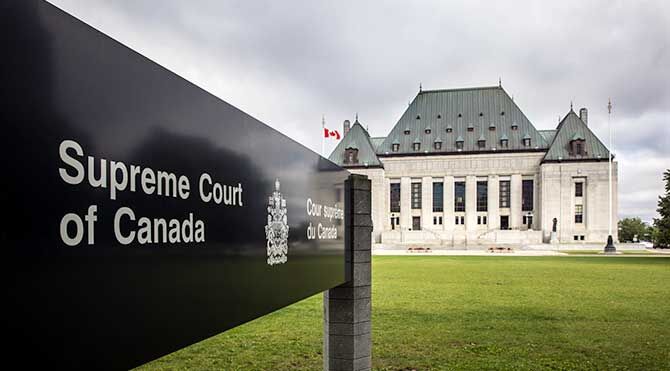Canada's supreme court to rule on expat voting ban
Canada’s highest court is to rule on a challenge by long-term expatriates to a law that denies them the right to vote in elections after they have been out of the country for more than five years.

 26 March 2018
26 March 2018Trudeau government wanted to scrap five year limit
The Supreme Court decided to begin hearings on the expats' challenge last week having postponed the case in 2016 because the Trudeau government had introduced an electoral reform bill, C-33, one of whose clauses would have scrapped the five-year limit.However, the court decided to finally hear the case now because, after two years, C-33 has made no parliamentary progress beyond a first reading, although the government still says it intends to press ahead with it.Two Canadians living and working in the United States initially brought the case after being denied the vote in the 2011 general election, arguing that citizenship, not residency, was the key requisite for the right to vote.Increasing international mobility
The two expats, Jamie Duong and academic Gill Frank, initially won their case before Ontario Superior Court in 2014, but the-then Conservative government appealed and, in a split decision in 2015, the Ontario Court of Appeal ruled that, while the restrictions were an infringement of citizens' rights, the violation was justified because the time limit preserved the “social contract” between indigenous voters and lawmakers.In their submission to the Supreme Court, Messrs Duong and Frank argue they maintain a “deep and abiding” connection to Canada even though, like many citizens in a globalised world, they have left the country for employment or educational reasons.“There is no pressing and substantial objective to justify the legislation,” the pair say. “Five years is an arbitrary marker, which is not rationally linked to a citizen’s connection to Canada, nor to being subject to Canadian laws.”'A Canadian expat is less of a Canadian'
The voting time limit was first introduced in 1993 but was not enforced until after Stephen Harper became prime minister in 2006. Civil liberties groups are backing the latest legal challenge, which has also been supported by one of Canada's most famous expats, actor Donald Sutherland.“Our election laws, as they currently stand, effectively say that as a Canadian expat, you are less of a Canadian than anybody else and that you have fewer rights,” Allan Nichols, president of the Canadian Expat Association, told CTV News Channel.Mr Nichols said that Canadians who lived abroad still contributed, directly or indirectly, to bilateral trade and diplomatic relations between Canada and the countries they reside in, and cited the example of various Canadian chambers of commerce operating in major cities around the world, where long-term expats are often employed.He added that, as “any government that’s in power has an impact on Canadians abroad,” expats should be allowed to vote.
For related news and features, visit our Brexit section. Relocate’s new Global Mobility Toolkit provides free information, practical advice and support for HR, global mobility managers and global teams operating overseas.
 Access hundreds of global services and suppliers in our Online Directory
Access hundreds of global services and suppliers in our Online Directory
©2024 Re:locate magazine, published by Profile Locations, Spray Hill, Hastings Road, Lamberhurst, Kent TN3 8JB. All rights reserved. This publication (or any part thereof) may not be reproduced in any form without the prior written permission of Profile Locations. Profile Locations accepts no liability for the accuracy of the contents or any opinions expressed herein.




























